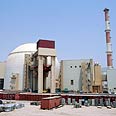
Report: Iran's nuclear plant hits setbacks
Iran tells IAEA it has run into major problems operating its first nuclear reactor in Bushehr, according to a New York Times report. Nuclear scientists unload 163 fuel rods from reactor core, as experts contemplate whether problem related to Stuxnet computer worm
Iran announced this week to the International Atomic Energy Agency (IAEA) that it has run into problems with its nuclear facility in Bushehr, which was scheduled to begin supplying electricity this month, the New York Times newspaper reported on Saturday.
The cause of the problem remains unclear, and experts said it may be anything from a solvable technical issue to a serious problem that may bring to the complete shutdown of the plant.
A report published Friday by the UN nuclear monitoring agency reveals that Iran told atomic inspectors on Wednesday that it intends to remove 163 fuel rods from the core of the reactor.
According to the New York Times, Iran did not detail the reason for the setback in its report to the IAEA, and some claim the Stuxnet computer worm may have caused heavy damage to the reactor's operating system.
In late 2010, Tehran admitted that the computer worm affected the computer system in Bushehr, causing minor damages to the centrifuges in some of the facilities, however claimed it had repaired the malfunction.
Last month, Russia's NATO representative warned that the Stuxnet attack could have triggered a "new Chernobyl disaster," similar to the one that took place in Ukraine 25 years ago. Iranian nuclear scientists expressed similar concerns two weeks earlier.
Full scale of damage unknown
Nuclear experts told the New York Times that even if Russia's concerns were exaggerated, the full scale of the damage caused by the computer worm remains unknown.According to the experts, the trouble behind the fuel unloading could range from minor safety issues to serious problems that would bring a complete shutdown of the reactor.
David A. Lochbaum, a nuclear engineer at the Union of Concerned Scientists told the newspaper that unloading a newly fueled reactor was “not unprecedented, but not an everyday occurrence,” adding that it may happen every 25 or 30 fuelings of the reactor.
“This could represent a substantial setback to their program,” David Albright, president of the Institute for Science and International Security, told the paper.
“It raises questions of whether Iran can operate a modern nuclear reactor safely,” he added. “The stakes are very high. You can have a Chernobyl-style accident with this kind of reactor, and there’s lots of questions about that possibility in the region.”
- Follow Ynetnews on Facebook










